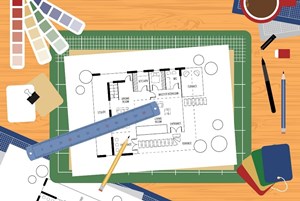The bedroom is quite possibly the living space that we spend the most time in at home.
This argument becomes even more convincing when we consider that the average working adult spends at least 10 hours a day outside the house on working weekdays. These 10 hours include being at the office, commuting, running errands, and even socializing, etc.
It also goes without saying that the average adult spends 7 to 9 hours sleeping each day.
In addition, sleeping is not the only thing we do in the bedroom. Many watch hours of television in bed, do personal grooming, and even play games on their smart phones, etc. But the bulk of our time spent in the bedroom is definitely for sleep.
And when we are sleeping, we put ourselves in a vulnerable condition to be affected by the energies around us. This is one big reason why the bedroom is one of the most critical personal spaces one has to pay attention to in feng shui.
The customization and personalization of bedroom feng shui will vary from person to person and room to room as there are various unique features of every bedroom that would affect how it should be feng shuied.
Some of these factors include the:
- Layout
- Size
- Bazi of inhabitants
- Directional sector of house it is located
- Energy maps such as flying stars and 8 mansions
- etc
But while a comprehensive bedroom feng shui audit would require a practitioner to get into a variety of diverse details, there are actually some bedroom rules of feng shui that applies to every home. You don’t need a compass or use complex calculations to assess them.
And adhering to them can often be enough to help residents to avoid bad luck, or even enhance good luck.
1) Main door should not see bedroom door
Whether it’s the master bedroom or a secondary bedroom, upon entry into a house via the front door, the bedroom door should not be in sight.
It doesn’t matter if the bedroom door is in front of the main door, at the side of the main door, or diagonally across the main door. As long as the room’s door is in view upon entry into the house, then it represents a leak of energy.
Such afflictions creates bad luck to household members of the rooms in the areas of wealth, relationships and harmony.
If this feng shui issue is present, the best remedy is to relocate the room door.
Otherwise, setup partitions to block the view from the front door, or install curtains at the door frame.
2) Bed position
As the bed is the most important piece of furniture in a bedroom, it’s placement and position plays a primary role in the feng shui of the space.
This is discussed in detail here.
But to do a quick recap of the main points, the bed should:
- Not have the sleeper’s feet pointing at the door
- Not have a window behind the headboard
- Not have a beam over the bed
- Not have washroom doors cutting into the bed frame
- Not be in a floating position where it is not leaned against a wall
- Not have a toilet in view from the bed
- Not have a ceiling fan above
- Not have a mirror reflecting the bed
- Have the sleeper’s head pointing towards a favorable direction
- Have walking space on both sides
If you are in the undesirable situation of having all afflictions present, the most simple way to alleviate these sources of sha chi is to use a canopy bed.
3) Living things as permanent residents
The bedroom at home are indisputably meant to be yin areas. This means that they are never supposed to be areas of excess activities such as what the living room is used for.
The presence of living things other than the dwellers can generate too much yang energy, which in turn disrupts sleep quality and causes a restless mind.
This is why feng shui masters often advocate that living things such as plants and pets such as fishes in aquariums should be promptly left out of the bedroom.
These living things are often permanent residents of the bedroom and not ideal in maintaining the yin atmosphere of the space.
While pets such as cats and dogs create considerably more yang energy that disrupts the energy flow of the space, they tend to move around the house and does not spend all their time in the bedroom.

So if you are a dog person, or simply in love with felines, it’s alright to have them share the bedroom when sleeping as long as they are not locked in the room 24 hours a day.
And if you absolutely must have plants, maybe due to interior design requirements or for blocking poison arrows like an exposed pillar, then faux plants might be a better option than real live ones. And the smaller they are, the better.
Consider that plants also compete with you for oxygen at night when they is no light source for photosynthesis to take place. That’s not really ideal from a health perspective when you need that oxygen for recharging your body when resting.
4) Curtains
Unless you live in a windowless bedroom, then curtains are essential feng shui fixtures.
The simply practical reason being that there should be a way that natural sunlight can be blocked from entering the space when desired. This is so as to retain a yin environment where residents are able to rest properly.

If you are woken up by the sunshine everyday even when it’s not a working day, then you’d probably agree that you could really use some extra sleep when there’s no need to wake up early.
While being woken by the sun is sometimes considered as a good omen, such an intentional setup does not count.
Even if you don’t have a window that faces the morning sun from the east, the faintest morning sunlight can often be bright enough to disrupt our beauty sleep.
Alternatives to curtains like blinders can also be useful for this purpose. But sometimes their shape and form can be hostile towards the energy in the room. So curtains are the safest bet.
You can go with day and night curtain combinations that cater to different needs when necessary.
4) Artwork
Artwork are generally not recommended for bedrooms. Especially those of considerable size.
If you must, the only type of canvas art, oil paintings, or photographs, should be of abstract art.
Paintings of places, animals, people, etc, sub-consciously pepper our minds with active thoughts. Often being a strong influence in causing tiring dreams and nightmares.

If you have a wolf painting in the bedroom for example, don’t you think that the visualization of the predator looking over you when you snore into the night a little disturbing?
Small picture frames placed on night stands, dressers and tables are usually fine as they don’t have a dominant presence in the space.
Because the bedroom is a personal space, it is said that depictions in paintings say what the person is about and what she is after.
So if you have a painting of a lonely women in the bedroom, don’t complain about your singlehood. And if you have a photograph of an empty street that leads to nowhere, it could be the very reason why your career has been standing still with no progression for years.
Manifestation is not something to mess around with.
5) Clutter
Clutter is one of the primary nemesis of feng shui.
They are not only an eyesore that induces a blurry train of thought, but also distorts the quality of energy of the space we live in.
Having said that, some creative professionals find that clutter inspires them to think outside the box. Some even profess that their best works were only made possible from the messy creative space they’ve created for themselves.
So unless you need clutter to muster some type of environment for specific purposes, the bedroom is still best left uncluttered.
6) Odd shaped room
The only suggested shape of a bedroom is square or rectangle. This is directly related to the feng shui of land shapes.
While this can seem like a law of home building to many, a lot of houses do have odd shaped rooms which residents have to contend with.
This could be due to the architect trying too hard to display his artistic taste, a restriction and limitation on the land available to work with, or even a specific request from homeowners to builders.

Trapezium shaped room
Whatever the case, there is actually a very simple way to rectify this problem whether you live in a triangular shaped room, trapezium shaped room, round room, etc.
Use partitions, dividers, interior curtains, or even cupboards to demarcate a sleeping space that is square or rectangle shaped.
While the original odd shape of the bedroom remains, this solution can help to minimize the adverse effects certain room shapes can have on the residents.
For example, a triangular room of often referred to as a fire-shaped room (火行房). These types of rooms can cause inhabitants to be moody, temperamental, and eccentric. Room shapes have a stronger inclination to elements than bedroom colors. This means that a triangle room has a much stronger fire energy than one that is painted in shades of red.
7) No extra beds
The only place where people in a bedroom would be able to lie down and sleep is the bed.
It’s doesn’t matter if it’s king-sized, queen-sized, twin or super-single. It should be the only place where one can sleep in.
Other furniture or fixtures often found in bedrooms that can enable one to sleep in include:
- Massage tables
- Sofa set
- Extra bed
- etc
The presence of such excess furniture can create a tendency for either partner in a relationship to stray.
The same can be said of the next feng shui bedroom rule.
8) Room within room
This feng shui affliction is one of the biggest causes of infidelity and affairs in marriage.
The concept states that there should not be a room within a room. This symbolizes a third party infiltrating a relationship.
Whether you marriage is a blissful one or a total disaster is another question altogether. But having a third party wreaking havoc in marriage harmony is something everybody would probably want to avoid.
The question then is what constitutes a room within a room?
This is actually a very fair question as master bedrooms these days can have luxurious washrooms, spacious walk-in wardrobes, hidden compartments like panic rooms, etc.
It boils down to two critical elements.
- Size proportion to bedroom?
- Does it have it’s own door?
If the enclosed space in the bedroom takes up about one-third of the total floor area AND has it’s own entry/exit door, then it is a “room” within the room.
Take note that a door is not the same as an entryway.
When this configuration is present, then you can remove the “room” by dismantling the door or by reducing it’s area by shifting the main wall that borders the two spaces.
9) Bedroom door facing
When facing is mentioned in feng shui, we often think about the facing directions with regards to the compass.
But in this case, we are referring to what is in front (directly outside) of the bedroom door.
Some of the fixtures and fittings you don’t want to see outside the door includes:
- Another door
- Kitchen
- Toilet
- Downward staircase
- Mirror
- Sharp corners
- Pillars
- etc
Again, keep in mind that we are talking about what is directly in front of the bedroom door. Objects and fixtures that are in view but not in front of the door have a much less significant impact on bedroom feng shui.
10) No windows that extends below the height of the bed
Many modern room designs have incorporated full length windows that expands the view observable in the space looking out. In fact, this can be very common when there is a balcony attached to the bedroom.
This can make a lot of sense when one has a great scenery view.
But when the bottom of the window pane extends below the height of the bed, a resident is considered to be sleeping on a floating bed.
While the negative effects of this affliction are usually minute unless badly aggravated, it is definitely not ideal for feng shui to be sleeping in such a configuration.
What about directions?
It was mentioned from the start of this discussion that a comprehensive feng shui audit of a bedroom would definitely take into account the directional sectors the space takes up on the floor plan. Energy maps would also be used to analyze the nature of energy in a bedroom.
But the feng shui rules described here applies regardless of which part of the compass a bedroom is located in.
If your bedroom happens to be located in an auspicious space in flying stars feng shui, it would still be unable to effectively draw on the luck of good fortune should it be afflicted with the various problems listed above.
In fact, they can also bring bad luck even if the space is deemed as auspicious.
So take these rules seriously and keep them in mind when assessing the feng shui of your bedroom.















